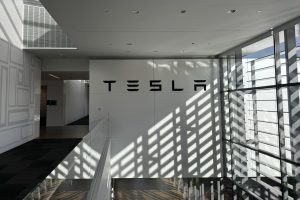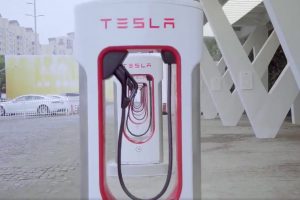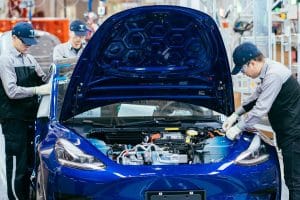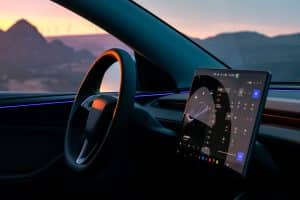- ⚡ Tesla’s Supercharger Network constitutes 90% of Japan’s 150 kW+ chargers, showcasing its dominance in the charging segment.
- 🌍 The North American Charging Standard (NACS) is expanding globally, with Sony Honda Mobility adopting it in Japan.
- 🚗 Sony Honda Mobility’s AFEELA EVs will be the first non-Tesla cars with access to Tesla Superchargers in Japan.
- 🤝 Tesla welcomes Sony Honda Mobility as the first automaker to join the NACS movement in Japan.
- 📅 AFEELA pre-orders will start in the U.S. in 2025, with deliveries beginning in 2026.
Tesla’s Supercharger Network: A Game Changer in Japan’s EV Infrastructure
In the rapidly evolving world of electric vehicles (EVs), Tesla continues to pave the way with its innovation and strategic partnerships. One of its most significant recent developments comes from Japan, where Tesla’s Supercharger Network has effectively dominated the landscape, capturing a staggering 90% of the 150 kW+ charging stations across the country. This accomplishment not only underscores Tesla’s influence in the EV market but also marks a significant shift in Japan’s transition towards more sustainable transportation solutions.
The Power of Tesla’s Supercharger Network
Tesla’s Supercharger Network is the backbone of its charging infrastructure, designed to offer fast and efficient charging solutions globally. The expansive network ensures that Tesla drivers can travel long distances without worrying about running out of power—a critical factor in the widespread adoption of electric vehicles.
- Comprehensive Coverage: In Japan, the Supercharger Network now comprises 90% of the 150 kW+ chargers, which speaks volumes about Tesla’s rapid expansion and reliable service. This dominance highlights Tesla’s commitment to improving the EV experience by reducing charging time significantly.
- Speed and Efficiency: The network’s ability to provide rapid charging solutions ensures that drivers spend less time at charging stations and more time on the road. This is crucial for reducing range anxiety and making EVs more viable for daily use.
Global Expansion of the North American Charging Standard (NACS)
A key element of Tesla’s strategy is the push for the global adoption of its North American Charging Standard (NACS). With its recent introduction to the Japanese market, Tesla is setting new industry standards that could potentially become the norm worldwide.
- Sony Honda Mobility Partnership: A landmark achievement in this endeavor is the partnership with Sony Honda Mobility, which plans to incorporate NACS into its AFEELA electric vehicles. This makes AFEELA the first non-Tesla brand to gain access to the Supercharger Network in Japan, demonstrating a significant milestone in EV interoperability and collaboration.
- Advantages of NACS: The adoption of NACS by Sony Honda Mobility signals a shift towards a unified and efficient charging standard. This could revolutionize the EV market by simplifying charging infrastructure and making EVs more appealing to consumers who may otherwise be hesitant due to charging concerns.
AFEELA: Leading the Charge for New Entrants
The collaboration between Tesla and Sony Honda Mobility is a promising development for the electric vehicle industry. AFEELA’s integration of Tesla’s NACS stands as a testament to the advantages of open standards and cross-brand compatibility.
- Pre-Order and Delivery Timeline: AFEELA’s vehicles are expected to hit the U.S. market with pre-orders starting in 2025, and deliveries set for spring 2026. This timeline presents exciting prospects for consumers in Japan and the United States, who are eager to experience a seamless and innovative EV journey.
Implications for the Future
The developments in Japan underscore a broader trend towards comprehensive and consumer-friendly EV infrastructure. As more automakers embrace Tesla’s charging standards, the possibilities for a universally compatible, efficient, and speedy charging experience grow.
- Consumer Benefits: Unified charging standards could significantly reduce costs for manufacturers, which in turn, could decrease retail prices for consumers. Moreover, interoperability between different brands’ vehicles could spark more innovations and improve the overall EV ecosystem.
- Environmental Impact: A more robust charging network infrastructure supports increased EV adoption, which is crucial for reducing carbon emissions and promoting sustainable transportation solutions.
Conclusion
Tesla’s strategic initiatives in Japan highlight not only the strength of its Supercharger Network but also its commitment to leading the global shift towards electric mobility. By fostering collaborations with companies like Sony Honda Mobility, Tesla is setting a precedent for the future of the EV market—one that prioritizes efficiency, accessibility, and environmental sustainability. The integration of NACS in non-Tesla vehicles like AFEELA symbolizes a new era of inclusivity and innovation, poised to transform the landscape of modern transportation.





